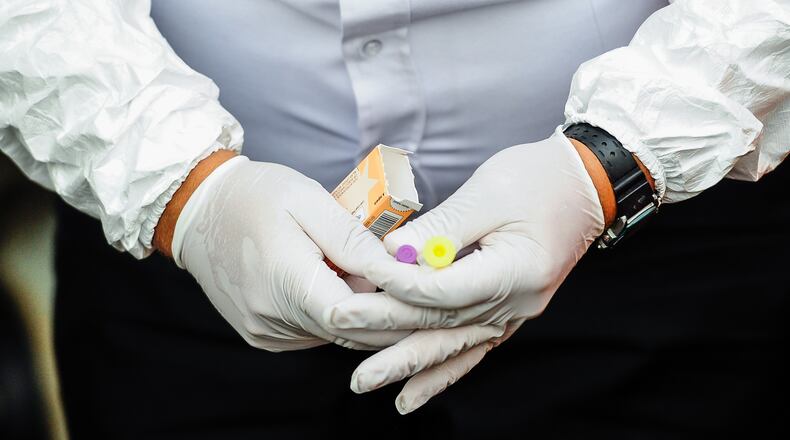MORE: Butler County spike in opioid overdoses prompts warning
“Butler County in the past 24 hours has been hit hard,” Butler County Coroner Dr. Lisa Mannix told this newspaper after the warning was issued. “Four cases that have come into my office are under investigation as drug overdoses with the potential of a potent fentanyl analog such as carfentanil among the culprits.”
In addition, recent accidental overdose by first responders and health care professionals in the region have gained national attention.
An officer at the Cincinnati Veterans Affairs Medical Center had to be treated with Narcan after reported exposure to drugs last week.
MORE: Narcan used on Cincinnati VA Hospital officer after contact with drugs
And in Fairborn, a firefighter-paramedic driving a suspected overdose patient to the hospital earlier this month began showing symptoms of an overdose himself, prompting his partner to jump into action and stop the ambulance in the middle of the road. An additional six firefighters also had to be decontaminated.
MORE: Ohio paramedic overdoses driving OD patient to hospital
Here are five things law enforcement organizations tell their staffs to keep from becoming the next victim of an accidental opioid exposure:
1. Understand that fentanyl can kill you. Fentanyl can be used as a cutting agent in heroin, or it can be pressed into a pill that can look like any other pharmaceutical. In California, for instance, a unscrupulous drug dealer pressed fentanyl into a pill that looked like an ordinary Vicodin. So the drug you encounter today can have fentanyl in it and you would never know it.
2. Know that fentanyl is transdermal. If you touch the heroin or Vicodin pill, you can absorb the pharmaceutical through your skin. If it had carfentanil in it, it could be deadly.
3. Wear proper protective gear. Never handle any drugs, even pharmaceuticals or marijuana, without latex gloves. If an officer is conducting a raid on a dealer of fentanyl, he or she should probably treat that raid as if hitting a drug lab. This means protective gear for everyone, including respirators.
4. Do not field test suspected fentanyl. If handling suspected fentanyl, you should not field test the drug under any circumstances. The less exposure you have to fentanyl, the better off you are.
5. Implement a naloxone program in the agency. Naloxone reverses an opiate overdose. If you or your partner are exposed to fentanyl and are experiencing overdose symptoms, the naloxone you carry with you can reverse that overdose and you can live to fight crime another day.
HOW TO GET HELP
- Naloxone (Narcan) is available via pharmacies, doctor's offices, or at no cost from the Butler County Health Department. Call 513-863-1770 to learn more.
- Call Butler County's Heroin Help Line at 513-781-7422
SOURCE: Butler County Health Department
About the Author

